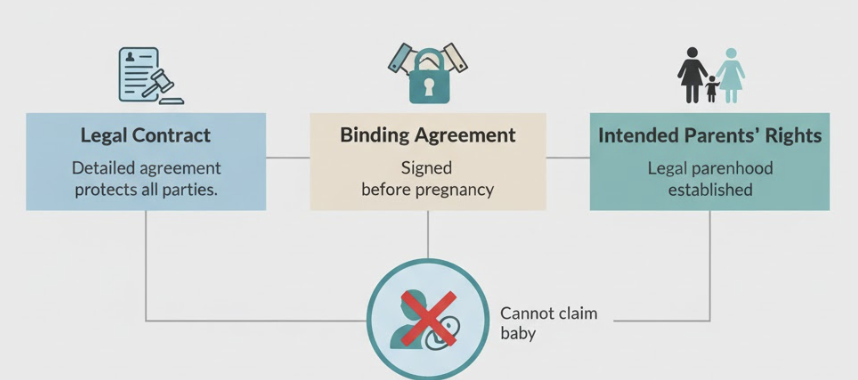If you are considering surrogacy, you may already feel a mix of excitement and nervousness. For many intended parents, one of the most common and deeply emotional concerns is: “What happens if the surrogate changes her mind and decides to keep the baby?”
Surrogacy is built on trust, contracts, and careful planning—but it is also an intimate human journey. The fear of losing parental rights can feel overwhelming, especially for those who have already faced years of infertility, failed treatments, or medical challenges.
The good news is that situations where surrogates try to keep the child are extremely rare. Professional surrogacy programs put in place multiple safeguards—legal, psychological, and medical—to prevent such disputes. Still, the answer depends heavily on where the surrogacy takes place, because surrogacy laws vary dramatically worldwide.
In this article, we break down the legal realities, international differences, protections available, and practical steps you can take as intended parents to minimize risk and feel secure throughout your journey.
Can a Surrogate Legally Keep the Baby?
The legal answer depends on the jurisdiction:
United States
In surrogacy-friendly states like California, Nevada, Illinois, the law is clear: surrogacy contracts are enforceable, and intended parents are recognized as legal parents before or immediately after birth.
Surrogates in these states cannot keep the child once agreements and pre-birth orders are finalized.
In contrast, some U.S. states have no legislation or ban surrogacy entirely. In those states, disputes could be more complicated.
United Kingdom
Surrogacy is legal but only on an altruistic basis. Surrogacy contracts are not enforceable.
By law, the surrogate is considered the legal mother at birth, regardless of genetics.
Intended parents must apply for a Parental Order to transfer legal parenthood.
If the surrogate refuses, courts decide based on the best interests of the child. While the law theoretically allows a surrogate to keep the baby, in practice, courts usually favor the intended parents, especially if the child is genetically related to them.
Canada
Surrogacy is altruistic, and contracts are only partially enforceable.
Technically, the surrogate is the legal mother at birth. Legal parentage is transferred by court order.
If a surrogate refuses, courts again prioritize the child’s welfare and the intentions of the parties involved.
Ukraine and Georgia
Both countries are considered among the most surrogacy-friendly.
Commercial surrogacy is legal, and intended parents are recognized as the only legal parents from the moment of conception.
The surrogate has no parental rights. Her name never appears on the birth certificate, and she cannot legally keep the child.
Other Countries
In countries where surrogacy is unregulated or banned (e.g., France, Germany, Italy, India, Cambodia), intended parents may face significant risks. Contracts may not be recognized, and parental rights may be contested or denied entirely.
Summary: Whether a surrogate can legally keep the child depends almost entirely on the legal system. In regulated countries like Ukraine, Georgia, and certain U.S. states, the risk is virtually zero. In altruistic systems (UK, Canada), legal processes may allow disputes, but courts usually side with intended parents.
How Common Is This Situation?
The fear is common—but actual disputes are rare. Several factors explain why:
Screening: Surrogates undergo medical and psychological evaluations to ensure they understand the process and are emotionally prepared.
Motivation: Most surrogates are women who have already had children and do not want to raise more. They are motivated by empathy, not by the desire for another baby.
Contracts and counseling: Legal contracts and counseling sessions clearly establish that the child belongs to the intended parents.
Statistics: While highly publicized cases occasionally appear in the media, they represent a tiny fraction of surrogacy journeys worldwide. The vast majority proceed without conflict.
What Happens If a Surrogate Does Change Her Mind?
In surrogacy-friendly jurisdictions (Ukraine, Georgia, California):
The surrogate has no legal grounds to keep the child. Intended parents are recognized from birth, and the law protects their rights.In altruistic but regulated systems (UK, Canada):
Initially, the surrogate is the legal mother. If she refuses to sign over parental rights, courts intervene. While delays and stress are possible, most cases end with the intended parents gaining custody, especially if the child is genetically theirs.In unregulated or banned countries:
The situation is far more complicated. Intended parents may struggle to gain recognition, face custody battles, or even risk being unable to bring the child home. This is why experts strongly recommend avoiding unregulated destinations.
What Legal Protections Exist to Prevent Disputes?
Legally binding contracts (where recognized): These set out rights and responsibilities, surrogate compensation, and intentions regarding parentage.
Pre-birth or post-birth parentage orders: Courts can declare intended parents as legal parents either before the child is born (pre-birth order) or after birth.
Birth certificates: In some jurisdictions (Ukraine, Georgia), intended parents are listed directly on the birth certificate.
Independent legal counsel: Both surrogate and intended parents should have their own lawyers to ensure fairness.
Agency guidance: Reputable agencies educate surrogates thoroughly and provide continuous support to prevent misunderstandings.
What Psychological Safeguards Are in Place?
Counseling sessions: Surrogates are required to undergo psychological screening to confirm emotional readiness.
Discussion of expectations: Topics such as bonding with the baby, separation after birth, and the surrogate’s motivation are explored in advance.
Ongoing emotional support: Throughout the pregnancy, surrogates receive counseling to manage stress, reinforce boundaries, and ensure confidence in their role.
These safeguards greatly reduce the risk of a surrogate regretting her decision later.
What Should Intended Parents Do If They Are Worried?
Research carefully: Choose a country and program with strong legal protections for intended parents.
Ask direct questions: Before signing, clarify: Will you be listed on the birth certificate? Are contracts enforceable? What is the legal process for parentage?
Build trust: Establish open communication with your surrogate. A strong, respectful relationship makes disputes even less likely.
Work with professionals: Use established clinics, agencies, and lawyers who specialize in surrogacy.
Prepare for contingencies: Even in the safest jurisdictions, plan for possible delays in paperwork or court hearings.
Real-Life Example: Baby M Case (USA)
The most famous surrogacy dispute was the Baby M case in New Jersey (1986–88). A traditional surrogate (who was genetically related to the child) refused to give up the baby. The court ultimately gave custody to the intended father (the genetic parent) but granted visitation rights to the surrogate.
Since then, most countries and U.S. states have moved toward gestational surrogacy only, precisely to avoid such conflicts. In gestational surrogacy, the surrogate has no genetic link to the baby, which makes disputes less likely and legally weaker.
Reassurance for Intended Parents
The idea that a surrogate might change her mind is one of the greatest fears for intended parents—but the numbers show it is more myth than reality. In regulated countries, the law protects intended parents, and disputes are virtually nonexistent. In altruistic systems, while surrogates technically have initial parental rights, courts overwhelmingly support the transfer of custody to intended parents.
The most important protections are:
choosing the right jurisdiction;
working with experienced professionals;
ensuring strong legal contracts;
prioritizing open communication and trust.
By taking these steps, intended parents can approach surrogacy with confidence, knowing that the chances of a surrogate keeping the baby are extremely low.






